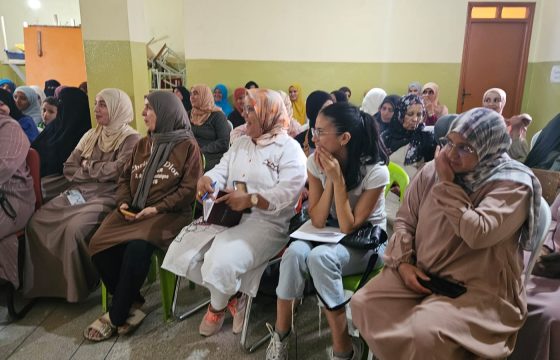Ennakhil Association
Founded in 1997 in Marrakech, the Ennakhil Association is a non-governmental development organisation committed to promoting equal human rights and anchoring participatory democracy in Morocco. Ennakhil works with vulnerable populations to combat all forms of gender-based violence, and to build civic, legal, social and economic capacity, particularly among women and young people.
Through its thematic areas of rights and justice, economic empowerment, democracy and participation, the association develops innovative grassroots approaches aimed at reducing discrimination and inequality by building resilience, in particular through the economic empowerment of vulnerable people. It provides a forum for dialogue on women’s rights and gender-related public policies, while supporting the implementation of inclusive local policies.
Women in El Haouz: structural inequalities and rebuilding through empowerment
The devastating earthquake in the province of El Haouz on 8 September 2023 brutally highlighted the vulnerability of local populations to natural disasters. Women and girls were particularly hard hit, not only because of the loss of life and property, but also because of the structural inequalities already present in their social, economic and institutional environment. This shock acted as an eye-opener, accentuating pre-existing gender-related vulnerabilities.
In a rural area marked by poor access to education, formal employment and public services, women suffer multiple forms of marginalisation. Analysis of socio-demographic and economic data for 2024 shows glaring gender gaps, whether in terms of school enrolment, labour market participation or residential security. These inequalities severely limit their ability to cope with crises, rebuild their livelihoods and play an active part in local economic recovery.
Socio-demographic profiles and gender inequalities
The province of Al Haouz, located in the Marrakech-Safi region, has a population of 642,815 according to the RGPH 2024 , 9.4% of whom live in multidimensional poverty. Women account for 48.3% of the province’s population, most of whom live in rural areas, which accentuates inequalities in access to services. Educational disparities are marked: 50.5% of women aged 15 and over are illiterate, while less than 4% reach tertiary level. This exclusion from education severely limits their economic independence. In fact, only 6% of women participate in the labour market, compared with almost 40% of the population as a whole. Of those who do work, more than half are employed in the private sector, often in precarious conditions, and 3.3% are unpaid family helpers. The unemployment rate among working women is 27.3%, revealing a high level of job insecurity. In terms of living conditions, 52.1% of households live in traditional Moroccan homes, with an average household size of 4.3 people. Finally, 80.4% of women speak only Tachelhit, which constitutes an additional barrier to access to information and public services. This combination of social, economic and linguistic factors exacerbates gender inequalities in the province.
Against this backdrop, there is an urgent need to rethink the ways in which the public and voluntary sectors intervene, placing the empowerment of women at the heart of development strategies. This is the background to the “Rehabilitation, Empowerment, Hope” project, an initiative supported by FAME as part of Morocco’s first Call for Expressions of Interest, aimed at strengthening the economic resilience of women and girls affected by the earthquake. By combining analysis of the situation, skills development, access to finance and support, this project offers a practical, sustainable and inclusive response. It represents an opportunity to transform the crisis into a lever for change, by placing gender equality at the heart of reconstruction and regional development.
A post-earthquake economic resilience project
In response to these findings, the “Rehabilitation, Empowerment, Hope” project aims to help strengthen the economic resilience of women and girls in the earthquake-affected municipalities of Asni and Moulay Brahim. Over a period of twelve months, starting in March 2025, 340 direct beneficiaries will be supported on a path to economic recovery. The project is divided into four phases: assessment, vocational training, access to microfinancing and post-creation monitoring. It targets three key sectors: sustainable agriculture, crafts and services. Management training, combined with local financial partnerships, will support the creation or revival of income-generating activities. The aim is threefold: to promote economic equality in reconstruction, to strengthen women’s skills, and to facilitate their access to resources. By placing women at the heart of the recovery, this project contributes to a fair, sustainable and inclusive reconstruction of the El Haouz region.
The next activities planned are three training sessions on agriculture, crafts and services for 30 women and girls, as well as four sessions on entrepreneurship, setting up business plans and marketing, and training sessions on setting up and managing cooperatives. These initiatives are designed to enhance their professional skills, particularly in key production sectors, and to facilitate their access to financial resources to launch income-generating projects or collective initiatives.
Despite the structural inequalities that hold them back, the women of El Haouz have a tremendous capacity for resilience. With the “Rehabilitation, Empowerment, Hope” project, by enhancing their skills and supporting their economic autonomy, the whole region is being rebuilt stronger and fairer. The future of El Haouz is being shaped by women. And it promises to be one of solidarity, sustainability and hope.





